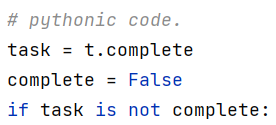found THIS when I checked me pull requests on my shared codebase today.

any ideas what I can throw at the person who wrote this? and had the AUDACITY to call it pythonic? comfort, advice, anything appreciated. seriously, wtf charlie? you know who you are.
– spaghetti suriya is losing their mind.

2 Comments
When it comes to learning a new competence, the path is never truly finished without a firm grasp of the essentials. This holds especially true in the domain of language services, like Russian-English interpretation. This distinctive capacity is not only about understanding the two languages; rather, it’s a extensive expertise that requires language-related precision, cultural understanding, and circumstantial knowledge.
Learning Russian translation can often be a arduous task. The Russian language, richly endowed in its own distinctive syntax and grammar laws, must be masterfully bridged with the English language, taking heed to preserve the original message and all its inherent nuances. The crux of understanding this translation lies not only in word-for-word translation but also in understanding the cultural differences that shape the way we use and comprehend language.
Effective Russian translation includes multiple stages, such as decoding the source language, understanding the meaning, and then re-encoding that meaning using the proper vocabulary and structure in the target language, all the while maintaining the original message’s tone, style, and intention. It’s a fragile process that needs a deep and insightful understanding of both languages.
Implementing Expert Methods for Russian Translation
A significant component of Russian translation is being aware of the varying text types and niches. The demands of business translation will greatly differ from literary translation – each necessitates a separate set of skills and in-depth knowledge. But irrespective of the text type, understanding the nuances of both Russian and English remains pivotal.
Of course, technology can be a beneficial ally in the translation process. Computer-aided tools and online dictionaries can automate some aspects of the job. However, they should not substitute human translators. The nature of language is inherently human, laden with feeling, cultural connotations, and situational context. While these nuances might be noticeable to a native speaker, they can readily be missed by a machine translator.
The secret to superior Russian-English translation involves blending both these elements. Let technology assist the process, but lead it by human interpretation and understanding. By considering each piece’s specific nature and utilising the right mix of human skills and technology, one can produce thorough, exact, and culturally sensitive Russian translation.
Cruising your way through Russian translation is undoubtedly complex, but with a strong understanding of both linguistics and cultural nuances, success is just nearby. As you launch on this fascinating journey through language, remember, each word, phrase, and sentence is a key to reveal another dimension of understanding and communication. Embrace this key, and open up a new world of possibilities.
Uncovering the considerable potential of Russian-English translation enriches your perspective, broadens your skills, and zooms in on the global demand for expert Russian translation. Put money in mastering this art and prepare to impress with your proficiency, accuracy, and cultural understanding.
you do realise, that I know russian, correct? sigghhh kids these days, can’t even get a proper history on their targets…